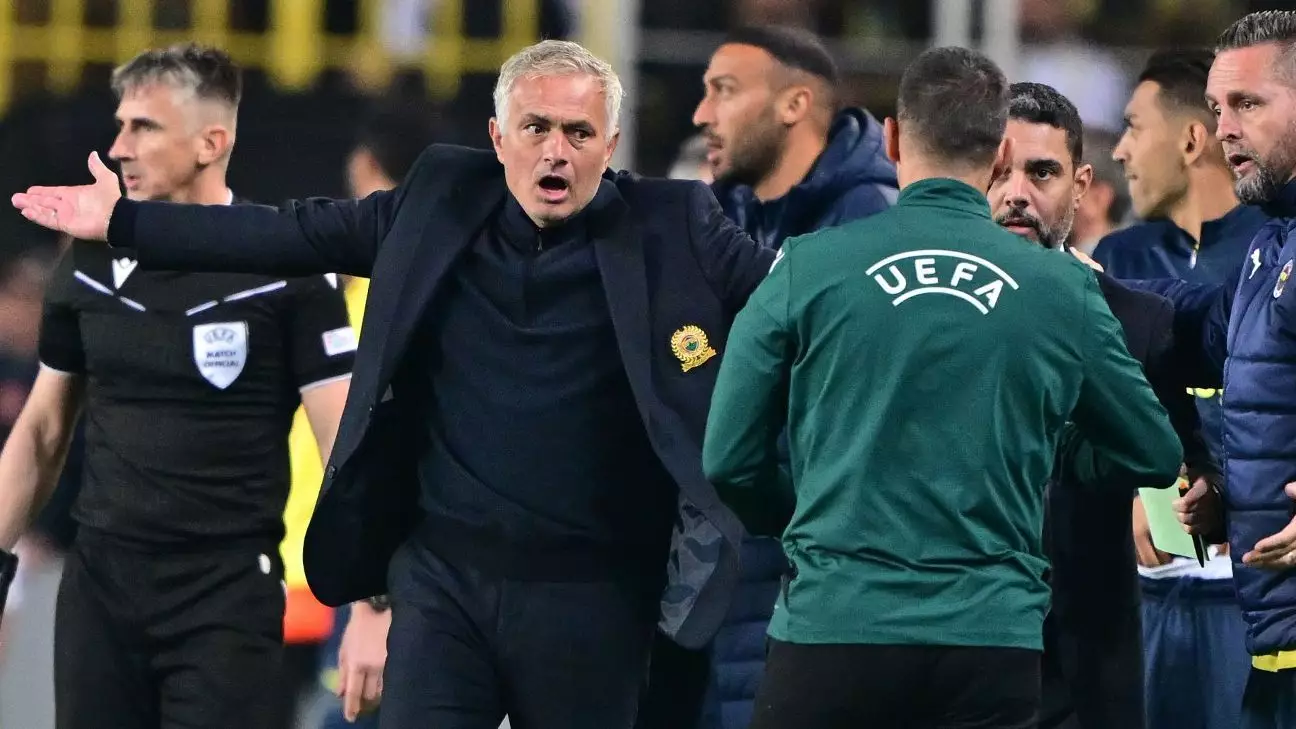Jose Mourinho is a name synonymous with both triumph and controversy in the world of football. Currently managing Fenerbahce, Mourinho’s recent comments reveal a growing dissatisfaction with the way UEFA has treated him compared to his counterparts. His perspective, particularly since the fateful 2023 Europa League final, raises questions about fairness in the realm of high-stakes football and the emotional toll management in such an environment can exact.
The 2023 Europa League final, held in Budapest, marked a turning point for Mourinho. His Roma team suffered a heart-wrenching defeat to Sevilla after a tense penalty shootout, an outcome that frustrated him deeply. The fallout came in the form of a four-match touchline ban imposed by UEFA for verbally assaulting referee Anthony Taylor. Mourinho stated his belief in a disparity of treatment, suggesting that since this event, he feels increasingly persecuted in European competitions. “I lost a final in a way that I still don’t accept,” he remarked, indicating not only his disappointment with the result but also with the subsequent ramifications of his actions. The intertwining of disappointment with the sense of injustice sets the stage for a broader discussion on how emotions in football can lead to real-world consequences.
Mourinho articulated his desire for equal treatment, asserting, “I deserve to be [treated] like everybody else.” The coach’s insistence on fairness is noteworthy, particularly in the football industry where star players and prominent coaches seem to garner varying degrees of scrutiny. The juxtaposition of rules, where elite coaches like Carlo Ancelotti and inexperienced managers face similar standards, aids Mourinho’s argument for consistent treatment across the board. This raises broader philosophical questions about accountability — should fame or experience shield individuals from discipline?
Mourinho’s discontent echoes around the football community, where the public often perceives favoritism toward certain figures. His situation invites us to think critically about how the governing bodies oversee their athletes and coaches. Can we delineate between justified disciplinary action and perceived bias? In Mourinho’s case, the lines seem blurred, affecting not only his professional endeavors but also his personal sentiments regarding his role in football.
The comments made after a recent 1-1 draw with Manchester United, where Mourinho received a straight red card over a penalty dispute, indicate a man grappling with the weight of his passion for the game. His subsequent remarks about seeking management roles outside of clubs embroiled in UEFA competitions underlined a desire to escape the stressors tied to high-level European play. “I’m never going to a team fighting relegation,” he noted, suggesting a reluctance but also a profound respect for the struggle inherent in such scenarios.
His statement showcases the duality that defines a manager’s career—a struggle against relegation can be just as taxing, if not more, than vying for titles. Mourinho called it “brave” to tackle relegation battles, acknowledging the emotional turbulence that ensues when clubs find themselves in dire situations. Here, he seems to reveal an aspect of his character; a respect for those who navigate the more fraught waters of league survival while longing for a different kind of challenge.
Furthermore, he expressed an openness to return to the Premier League, where he has enjoyed significant success. His mention of London as his home adds a personal touch to the professional roadmap he envisions, a blend of nostalgia and ambition guiding him forward in his career.
Jose Mourinho’s journey reflects the trials and tribulations that accompany a life steeped in professional football management. His expressions of discontent with UEFA reveal layers of complexity, blending personal emotion with professional responsibility. As the sport evolves, scrutiny over equitable treatment of coaches and players alike will remain pivotal. Mourinho continues to adapt to these challenges, searching for a place where his passion for the game can thrive without the weight of undue judgment or pressure. Whether this involves a future in the Premier League or embracing a new chapter with Fenerbahce, his story remains a compelling narrative within the larger tapestry of football.

